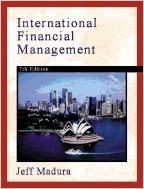Question
You have determined in your mind that you would like to have a business of your own, although your father runs a family restaurant in
You have determined in your mind that you would like to have a business of your own, although your father runs a family restaurant in your local city. You have therefore, decided to have a medium size snack and cocktails bar which will accommodate the cruise ship passengers who visit your city. You plan to keep the business for five years after which you will sell it off to your brother John for $2,000,000 and go off to do your Masters Degree in the UK. Though you will be occupying the establishment from your grandmother for free, you have decided that you need to make some improvements to the property which will cost you $1,500,000. Additionally, you will spend $275,000 in bar stools, tables and decorations. If this space had been leased out, it would have fetched a lease rental of $75,000 per year. You will depreciate the assets over 7 years using MACRS. You have determined that you would need an average cash balance of $15,000 and inventory of $20,000 while Accounts payable should average $10,000. You plan to borrow the money from a local bank and pay interest at a rate of 15 percent. To increase your chances of success at the business you plan to have your cousin Johnathan to conduct a market survey which will cost you $100,000. Your new venture will decrease the revenue your family business will earn by $15,000 per year and you have agreed to allow your father to take this amount from your allowance as a shareholder of the family restaurant. Revenues are projected to be $500,000 the first year and is expected to increase by 20% the second year, 15% the third year and to continue to increase at 10% thereafter. Fixed annual operating costs are expected to be salaries of $110,000, Utilities $75,000, Food and Liquor License is 15% of gross revenues and taxes are 40% of net revenues. -Calculate the initial outlay and depreciable value of the project -Calculate the annual after-tax operating cash flow for Years 1 -5. -Determine the terminal year (in year 5) after-tax non-operating cash flow.
Step by Step Solution
There are 3 Steps involved in it
Step: 1

Get Instant Access to Expert-Tailored Solutions
See step-by-step solutions with expert insights and AI powered tools for academic success
Step: 2

Step: 3

Ace Your Homework with AI
Get the answers you need in no time with our AI-driven, step-by-step assistance
Get Started


